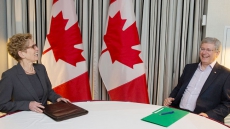TORONTO — Hundreds of thousands of international students flock to Canadian univesities each year. But prospective students from the U.S. may find Canadian schools even more enticing this year thanks to the low loonie.
That's good news for Canada's universities and local economies, but it could make it more difficult for Canadian applicants to get acceptance letters from some schools.
"A lower Canadian dollar does mean (some international students) can get a university education that's among the world's best at a reduced price," said Richard Levin, the University of Toronto's executive director of enrolment services and university registrar.
This year, international students paid, on average, nearly $22,000 in tuition, according to Statistics Canada.
The currency's downward spiral has left the loonie hovering near the 70 cent US mark. If the loonie doesn't budge much, undergrads paying with U.S. dollars would pay, on average, about US$15,000 — or roughly US$7,000 less than when the loonie is on par with their currency.
That's a bargain for those from the U.S., where the average tuition this academic year at a public four-year college was US$9,410 for in-state students and US$23,893 for out-of-state, according to the College Board.
The discount will likely lure more international students to Canada for the next academic year, especially since it's already considered more affordable than other top English-language destinations, said Jacquelyn Hoult, the director of communications for The Canadian Bureau for International Education (CBIE).
Though that won't be certain until enrolment numbers are in later this year, Levin said when the exchange rate is low, U of T receives more calls from American parents and prospective students wondering if the school charges fees in Canadian dollars.
Already, more Americans than usual are applying to Montreal's McGill University for next year, said Kathleen Massey, the university registrar. She attributes the 13 per cent increase to the favourable exchange rate.

"I think the lower dollar certainly makes education more affordable for many students," said Karen McKellin, the University of British Columbia's executive director of its international student initiative.
Each of these universities sets targets for how many international students they want to attract, and the number of them coming to Canada has been on the rise for years.
In 2014, more than 336,000 international students attended Canadian schools, according to the most recent numbers from the CBIE. By 2022, the government wants to boost that number to more than 450,000.
Students from abroad help foster a cosmopolitan learning environment that benefits all students, university representatives say.
But there's no question: they also offer a financial incentive.
Full-time undergraduate international students paid an average of $21,932 in tuition this academic year, according to Statistics Canada. That's nearly $16,000 more than their Canadian counterparts. Full-time international graduate students, on the other hand, paid on average nearly $8,000 more.
The Canadian Federation of Students has repeatedly accused post-secondary institutions of exploiting international students to replace lost government funding and generate revenue.
U of T's Levin said the steeper tuition for these students is partly to cover a lack of government funding for students from abroad and to fund extra support programs for them.
McGill's Massey, meantime, said universities in Quebec do not benefit much financially from international student tuition fees. UBC guarantees returning international students their tuition won't increase more than five per cent each year, said McKellin.

International students also boost local economies.
In 2012, when Canada hosted 265,000 students from abroad, they spent about $8.4 billion (including tuition) and generated more than $455 million in tax revenue, according to a federal report on Canada's international education strategy. Their activities helped sustain about 86,000 jobs, the report reads.
But for all the positive benefits, it could also mean tougher competition for post-secondary spaces for Canadian students.
At McGill, for example, there are no hard targets for how many international students are admitted, said Massey — only for how many students in total the school is able to accept.
Roughly half of the school's student population is from Quebec while the remainder is split between Canadian students from other provinces and territories and international students, she said. But those numbers can vary from one year to the next.
"We're looking for the academically strongest students from across the world," she said. "So if there are excellent students from the U.S., we would love to see them admitted to McGill, provided that we have space."


